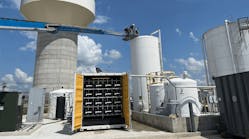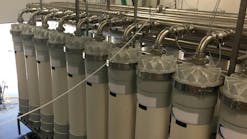Back when water treatment dealers marketed and sold old, traditional bottled water coolers for business and residential use, there was increased competition from retailers and other shops that were also selling these basic units. As technology and public awareness of water contamination issues advanced, however, so too did these water coolers. In fact, modern, advanced point-of-use (POU) drinking water system’s primary objective is no longer to just chill or cool water.
While some customers may still be interested in lower end bottled water coolers, business owners and homeowners can now affordably have a POU unit installed. Today’s water treatment dealers who are selling point-of-use drinking water treatment systems often compete with other water treatment dealers selling this equipment as well. We spoke with several experts to see how you can differentiate your business in this product category.
Comes down to quality and convenience
According to the water treatment professionals we interviewed for this article, several factors can separate a dealer’s business. Quality of product and service, however, can be a significant difference maker. As Mike Rice, director of marketing for Follett Corporation, confirms, “There certainly is a spectrum of quality that is evident in the marketplace.”
Over the years — as the public’s preference swayed from other beverages to healthy, clean water — water treatment professionals and investors from outside of the industry started to gravitate toward selling and investing in POU drinking water systems. As a result, big-box retailers selling lower end water cooler equipment became less of a competition concern.
According to Barry Bleahen, vice president of marketing for Waterlogic, today’s cooler competition is more aware of water contamination issues and is also selling higher end equipment, making it increasingly difficult for dealers to gain a competitive edge. Bleahen notes that success can be found using a three-pronged approach: Offering peace of mind; delivering programmatic solutions; and being a water expert partner.
“Offer peace of mind to the office manager,” asserts Bleahen. “Make it simple to contract for a water solution and eliminate the worry about what system to choose, hiring a plumber for installation, concerns if the system is operating correctly, replacing filters, system maintenance and repair.”
Dealers should also deliver programmatic solutions for purchasing managers who demand a budgeted and managed program across multiple locations with detailed reports on assets, spend and service history, continues Bleahen. “[And] act as water expert partner for the facility director sourcing a large installation that demands a custom solution and equipment particular to the water conditions and location/building environment.”
In today’s fast-paced world, consumers who are mindful of water contamination issues also value a quick, hassle-free sale. It is important to become familiar with each individual customer, gauge their specific needs and then deliver the appropriate sales pitch and equipment advice.
“Every consumer is an individual and there are no one-size-fits-all answers. But, at the end of the day, if I put myself in the consumer’s shoes, I just want to make an easy, informed purchase and feel good about it,” notes Abe Yedid of BLU Logic USA. “There are all different [types] of consumers and different reasons why they purchase a water treatment product.”
Furthermore, dealers need to be mindful and sensitive to the fact that some customers may be unsure about buying from a water treatment dealer salesperson and not fully understanding water chemistry and industry jargon. “Some consumers like to educate themselves and then just shop at the most convenient location. On the other hand, some consumers do appreciate discussing water treatment equipment and options with someone fully dedicated and knowledgeable,” adds Yedid.
Do not rush education and professionalism
Oftentimes, the selection of drinking water treatment systems for a workplace is a quick decision. However, there is a significant opportunity for water treatment dealers to showcase their knowledge of water chemistry and delivering a healthy, quality supply. First, dealers need to study the water contamination issues and trends of the area and get to know the customer’s current water quality through testing.
“Because water characteristics are different in every town in America, the water treatment dealer is going to be in a better position to match the treatment method to the water quality in that area,” says Don Orr, vice president of point of use products for MTN Products.
And, in addition to offering quality POU drinking water systems, Orr emphasizes quality follow up service as a competitive difference to lower end units and retailers.
“Generally, when customers are buying [these systems] through a retailer, they’re basically installing it themselves,” notes Orr. “When purchased through a commercial dealer, a professional installs the system and there is less risk of leak or installation failure.”
There are other ways that dealers can utilize their staff’s expertise and professionalism to win sales. Some ways Bleahen says a professional service provider can excel include the following:
- Match the water unit features to the particular workplace needs (capacity, quality, aesthetics, etc.).
- Support the decision-maker in communicating the features of the system and the health and wellness benefits of drinking water to the workplace population.
- Offer premium purification systems. Advanced technologies, such as RO filtration and in-tank UV sanitization. Key machine certifications, such as UL and NSF, found on brands from a professional service company underwrite a quality and operational performance that best suites a commercial workplace.
- Provide for predictable budget management and predictable machine performance.
- Offer a comprehensive water offering to meet all the needs of the workplace, including chilled, hot and sparkling and often the addition of an ice solution.
- Perform a quality installation, tapping into the building water supply, managing pressure issues, installing leak prevention and detection systems, etc.
- Ensure optimum machine performance over time through proactive, preventative maintenance, including filter changes, sanitization and hot tank de-scaling as necessary. Many of these necessary tasks are invisible to the workplace decision-maker.
- Respond to service needs, repairs and emergencies to ensure minimum interruption of water service. Plus, the added assurance of warranty on equipment and insurance coverage in case of system failures.
Emerging trends
Water treatment dealers selling POU drinking water systems can also benefit from several prevalent emerging consumer trends. In addition to customers’ interest in promoting drinking water as a healthy lifestyle practice, office managers are also enhancing the workplace to meet employees’ interests and boost morale. In particular, increased interest in ice and refreshments is an opportunity for water treatment dealers.
“From a market dynamics perspective, in addition to an economic recovery perspective, there are some things that are starting to move the needle,” explains Rice, adding that a dealer needs to differentiate its business in the areas of knowing water quality, equipment sanitization, reliability and service. “We’re seeing more interest in the office coffee side and for iced coffee and iced tea. And, from an ice perspective, the trends have to do with ice types. We continue to see significant interest in chewable ice.”
Maintaining practicality and health
As Yedid mentioned, putting yourself in the customer’s shoes is a good practice. Customers who are interested in your sales pitch are most likely also cognizant of health, overall costs, filtration options, ease of use, safety features, durability, warranty and convenience features.
Although cross contamination issues are being addressed with today’s POU drinking water systems, such as through recessed dispensers and enclosed units, bacteria can still thrive in and around many of these systems. Therefore, it is important to know the latest developments in this equipment and share these features with customers.
“There have been a tremendous amount of advancements recently [and] antimicrobial components are just a start,” says Yedid, citing bottom drip trays that eliminate the breeding of bacteria near the dispenser as another example.
Solving the ease of maintenance and use concerns of today’s consumer, the experts we interviewed for this article credit self-sanitization as a significant advancement. UV, ozone or another disinfection method is incorporated in many countertop POU drinking water systems.
“It’s the technology incorporated in these machines that keep them out of big-box stores,” notes Orr. “The commercial customer is looking for more bells and whistles — does it self-sanitize; does it have an antimicrobial component; does it have instant hot?”
As consumer buying trends and interests shift, stay ahead of the curve with equipment and sales approaches. Remember, no two customers are exactly alike. Customize a sales pitch, treatment solution and service around each specific account. Then, follow through with certified, proven equipment that has all the features needed to match the consumer’s needs.


